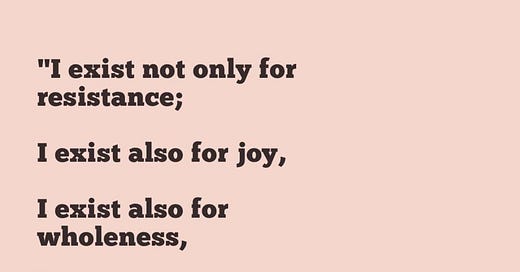If you’re subscribed to this newsletter, you’re probably aware that I recently lost my job as the Othering correspondent at The Correspondent. The publication wound down at the end of 2020 due to financial problems, so now I do things like talk about the transformative power of love on Instagram.
TC’s shutdown was quite a shock but, in retrospect, I’m thankful for the timing. The collective ‘reset and renew’ energy that comes with every new year helped me feel more at peace with the transition. As I came to terms with my new circumstances, I decided to attempt to do something I’ve never quite been able to do: I decided to just live.
It might seem a bit strange that I feel as though this is the first time that I’ve been able to ‘just live’, but really, I think the vast majority of us can relate to this in some way. We have to work so we can pay for the resources we need to maintain our health, housing and other needs. We rush from pillar to post—or, in a pandemic, from kitchen to home office—in pursuit of our next pay cheque. If we can, we make time for joy and rest and communion with our loved ones at the weekends. If not, we postpone those things in favour of a few more hours of sleep and scrolling on social media.
In my case, my inability to simply live has been informed by more than just the need to survive within capitalism. I’m a justice-minded person in a manifestly unjust world, and I have the particular gift of being able to communicate in ways that help people see (and hopefully do something about) injustice. I’ve spent the last ten years raising my voice against systemic exclusion. Most of that effort has been bad for my bank account but good for my spirit; I don’t regret any of it. Still, a whole third of my entire life has unfolded on the knife edge of loud resistance, so it’s been quite easy for me to fully believe the slogan “I exist to resist”.
But fighting the system isn’t why I exist.
I exist, very simply, to live.
Again, I realise this might sound strange. But again, put yourself in my shoes. Living is not an easy thing to do. Not in a world organised around death-making systems. Not when reality is marred by relentless exploitation and manufactured scarcity. And especially not if you embody a marginalised identity(ies). When you have to fight the system just to exist, it’s hard to remember what it means to live.
To live is to be able to rest; to breathe and be uninterrupted in it. To experience joy, connection and community without violence. To create, serve and contribute to the greater good. To have autonomy and agency in fashioning a purposeful future for yourself. To reach as far into the limits of your potential as you can, knowing that you are allowed to fail and recover without being punished cruelly. To experience the highs and lows of consciousness, knowing that it is fleeting and should be cherished. To love and be loved. To be human. To have your humanity be seen as enough, not only by you but also by those around you.
I am a person whose body reads ‘young, African, queer, woman’. Bodies like mine are considered legitimate receptacles of suffering and death in this white supremacist, capitalist, heterosexist, imperialist world. So it has taken me thirty years to understand that I exist not to fight, not to rage, not to resist—not even to teach—but to live.
It might seem sad that I have arrived at life three whole decades after my birth. I remind myself whenever I can that being in survival mode for so long was my way of making sure I could even make it to this place. I’ve been fighting for my life this entire time. It makes sense that I’m only just now learning how to simply live it.
A queer African woman simply living: that’s not a very common genre. I like to think of this new phase I’m in as some sort of alchemy; science-fiction; system hacking, you name it. I’m trying to do a thing I’m not really allowed to; a thing that’s technically not possible within the bounds of this world. So if you enjoy watching magic tricks, particularly of the death-defying variety, stick around.
Till next time
OluTimehin, alive.




Dear OluTimehin, I am glad to hear about the self-discovery and self-care you have begun to appreciate. For what it is worth, I congratulate you for arriving at this stage in just three decades. This epiphany tends to unfold for many around two to three scores. So, revel in your successful hacking of the system. I may not pride myself with the exact attributes as you, but as an African woman in a white privileged and capitalist world, my battle intersects with yours in more ways than we acknowledge. Therefore, whether I fall short of one or more of your attributes, nothing but a concerted effort against the intersectionality that impact us, will mean that we truly live. Therefore, we must continue as troubadours, but we traverse on our own terms, together. All the best.
Hello OluTimehin! I'm so very glad to see your first article, having enjoyed being enlightened and challenged by you via TC. Now, as then, your perspective is so refreshing. and yet, you have distilled what so much of my own life has been about: survival first, and now the experience of love, joy, wholeness. Don't feel badly about only discovering "life" in your third decade; I am in my fifth and am only now discovering it! It reminds me of a quote from David Bowie: "Aging is an extraordinary process where you become the person you always should have been." Here's to sharing the journey of becoming and "just living."